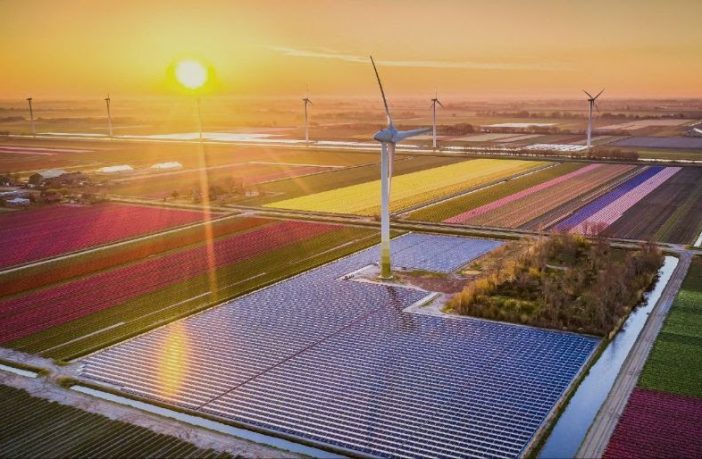- The COP28 Presidency, the International Renewable Energy Agency (IRENA), and the Global Renewables Alliance (GRA) launched a joint report today on the sidelines of the Pre-COP event in Abu Dhabi, titled Tripling Renewable Power and Doubling Energy Efficiency by 2030: Crucial Steps Towards 1.5 °C.
The report provides actionable policy recommendations for governments and the private sector on how to increase global renewable energy capacity to at least 11,000 GW while also doubling annual average energy efficiency improvements in the target period. This falls under the COP28 Presidency’s Action Agenda objective of fast-tracking a just and orderly energy transition to keep 1.5 °C within reach.
The report was launched on the sidelines of Pre-COP, a meeting held in Abu Dhabi a month ahead of COP28 for countries to lay the groundwork for negotiations at the global climate summit. The report aims to help guide parties on the key enablers required to meet the energy targets.
COP28 President Dr. Sultan Al Jaber said in the report, “Tripling the deployment of renewable power generation and doubling energy efficiency are amongst the most important levers to cut greenhouse gas emissions. I am now calling on everyone to come together, commit to common targets, and take comprehensive domestic and international action, as outlined in this report, to make our ambitions a reality.”
IRENA Director-General Francesco La Camera added, “Our mission is as clear as it is urgent: We need concerted action to triple renewable power capacity by 2030. This includes urgently addressing deeply entrenched systemic barriers across infrastructure, policy and institutional capacities stemming from the fossil-fuel era. IRENA’s World Energy Transitions Outlook, which provides the analytical foundation of this report, warns that the energy transition is dangerously off-track, demanding immediate, radical collective action. This report outlines actions governments must prioritize to fast-track the global energy transition and keep 1.5 °C alive.”
Bruce Douglas, Global Renewables Alliance CEO, said, “Tripling renewable energy and doubling energy efficiency is the most impactful commitment policymakers can make to combating climate change. These steps will deliver cleaner electricity systems, open up access to affordable energy and deliver clean green jobs for millions of people. The rapid upscaling of renewable energy will require policymakers to work hand-in-hand with industry and civil society to urgently implement the enabling actions in this report – infrastructure and system operation; policy and regulation; and supply chains, skills, and capacities. Critically, these areas must be reinforced by low-cost financing and international collaboration. Working together to secure a livable future for all.”
The report, which draws extensively on the analysis presented in IRENA’s World Energy Transitions Outlook 2023: 1.5 °C pathway, divides the key enablers into five sections, covering:
- Infrastructure and system operation: power grids, energy storage, end-use electrification, sector coupling and infrastructure planning, demand-side management.
- Policy and regulation: improving energy efficiency, market incentives and fiscal policy, power market design and regulation, streamlining permitting, reducing negative impacts, maximizing social and environmental benefits.
- Supply chain, skills, and capacities: building resilient supply chains, education, training, and capacity-building.
- Scaling-up public and private finance.
- Enhancing international collaboration.
The collaboration between the COP28 Presidency, IRENA, and the GRA reflects the growing global consensus on achieving these targets. Ahead of COP28, the Presidency and the European Commission are calling for countries to support the Global Renewables and Energy Efficiency Pledge, with Champion countries already committed to supporting these global targets.
Author: Bryan Groenendaal















